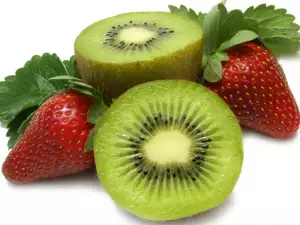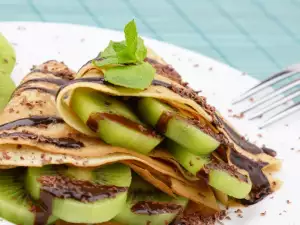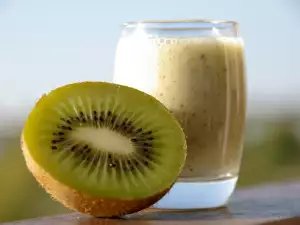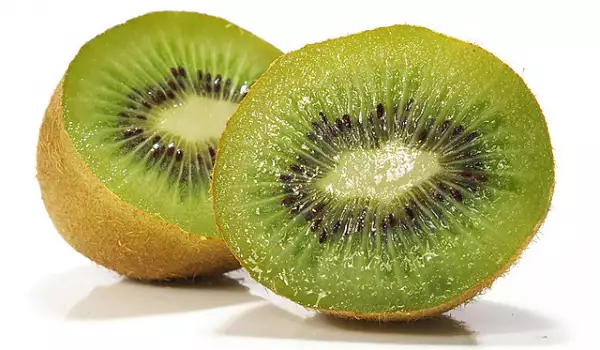With more vitamin C than a similar-sized orange, the bright green pulp of a kiwi adds an amazing tropical breeze, when added to any fruit salad. Kiwi is a small fruit, with an almost creamy texture and refreshing flavor reminiscent of strawberries, melon and bananas, but naturally with it’s own unique sweet and slightly sour taste.
Kiwi is kind of angiosperm plant of the Actinidia genus.
Kiwi come from China, where they were known as Yang Tao. Much later, around 1960, it was called Chinese goose fruit, but its present name is due to the similarity in color with a bird from New Zealand - the Kiwi.
Kiwi is a tall shrub, tree /vine/ that reaches 20 meters. There are many beautiful bush leaves that fall in autumn. Same-sex actinides make it a dioecious plant, which means that there are male and female parts, which are pollinated by wind and bees. The bush blooms in June and fruits ripen in late October and are ready for consumption in December. The fruits are cylindrical with a rounded shape and weigh from 50 to 100 grams.
Currently one of the leading commercial producers of kiwifruit are Italy, New Zealand, Chile, France, Japan and the United States.

Composition of kiwifruit
Kiwifruit contains more than 80% water and 18% solids, which includes 1% acid, 1.6% protein, 9 to 12% sugar and 300 mg of vitamin C. The composition of kiwi also includes vitamins A, B1, anemone enzyme, mineral salts, iron, sodium, potassium, phosphorus, calcium, chlorine, sulfur.
In 100 grams of tasty fruit is 0 fat, 49 Kcal, 1 g protein, 2.6 g fiber and 11 g carbs.
Kiwi Species
Wild species of kiwi are numerous. Notable are only two types of culture - Actinidia deliciosa and Actinidia chinensis, which are intended for use fresh. They are brown, with a fluffy and soft shell, but their flesh is juicy and green. Around the core of the kiwi, there are tiny black seeds which are very rich in vitamins.
Selection and storage of kiwifruit

When buying kiwi, you should choose tough and hard fruits. They ripen at room temperature in a few days, if they are kept in the fridge, this period is extended to several weeks. During this time, the fruits do not lose their properties due to their fluffy coating.
Kiwi fruit can be left to ripen for a few days, just wrap it in a paper bag with apples, pears or bananas.
Kiwi should not be accepted long after it is cut, as it contains enzymes that would make it too soft.
Culinary uses of Kiwi
In culinary applications, kiwi is used to soften fish and meat, which is due to it containing the enzyme that makes the meat more tender. Besides fresh consumption, kiwi undergoes treatment. Consumed in dried form, it is used in the preparation of many foods and beverages.
Kiwi is a component of many drinks. It is often mixed into various dietary juices, non-alcoholic cocktails with other fruits, alcoholic cocktails with bourbon, Campari and tequila.
Kiwi fruit is used to decorate cakes, pancakes, fruit salads, creams and more.

Benefits of Kiwi
This fruit is a rich source of phytonutrients, vitamins and minerals.
• Phytonutrients contained in kiwi protect your DNA. Kiwi has the ability to protect DNA in the nucleus of human cells from oxygen-related damage. In a study involving 6 and 7 - year old kids, it was found that the more they have kiwi, the less it is likely that they will have respiratory problems including wheezing, gasping breath, or coughing at night.
• Antioxidants in kiwi offer comprehensive protection to your body. Kiwifruit is an excellent source of vitamin C, which neutralizes free radicals that cause damage to our cells and lead to problems such as infection or cancer. In addition, it contains vitamin C, however, this fruit is a good source of vitamin E, which in turn is an important fat-soluble antioxidant. The combination of these water - and fat-soluble antioxidants in kiwi gives it the ability to protect against free radicals in all directions.
• Fiber control of blood sugar and cardiovascular care for our health and the health of the colon.
• Due to the high presence of vitamin C in the kiwi, we gain natural protection against asthma from it.
• Kiwifruit protects us from Macular Degeneration (visual impairment due to age). Always add sliced kiwi to your cereal breakfast, in milk during lunch and green salad for dinner.
• By having kiwis, you improve the good functioning of your cardiovascular system. Even a few slices of kiwifruit a day can significantly reduce the risk of blood clots and reduce the amount of fat in it, thereby helping to maintain good cardiovascular function.
Dangers of kiwies
Kiwifruit is among the few foods containing oxilates - natural substances found in plants, animals and humans. When they become too concentrated in body fluids, they can crystallize and cause health problems. For this reason, people who have problems with your kidneys or gall, need to be careful with the intake of these fruits.
People with latex allergies often have the appearance of cross-allergy to certain foods - avocado, kiwi, banana and others. So, if you suffer from this type of allergy, be careful with kiwi!
Weight Loss with kiwi
Kiwifruit contains enzymes for the formation of collagen fibers and accelerates fat burning. Those who are trying to lose weight, can eat a few kiwies daily. On the other hand, the kiwi fruit is very suitable for carrying out the day of discharge.









